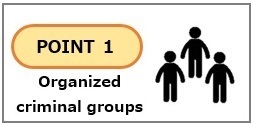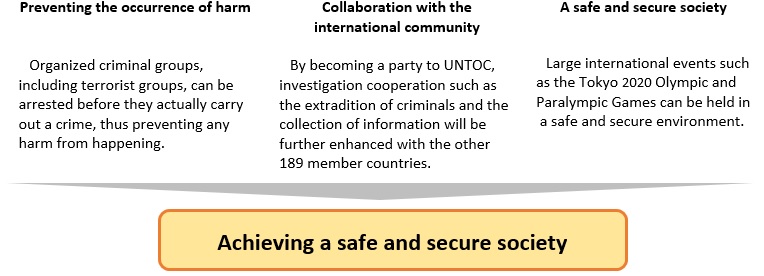Understanding the Crime of Preparation of Acts of Terrorism and Other Organized Crimes
What is the “Crime of Preparation of Acts of Terrorism and Other Organized Crimes”?
This will explain it in an easy-to-understand way for those who would like to know more.

This will explain it in an easy-to-understand way for those who would like to know more.

What is the “Crime of Preparation of Acts of Terrorism and Other Organized Crimes”?
A case falls under the “Crime of Preparation of Acts of Terrorism and Other Organized Crimes” when it meets the following elements: (1) an organized criminal group (2) planned serious crimes and (3) made preparations to carry out those plans.
This makes it possible to arrest the criminals before any crime is actually carried out, which can prevent harm and other forms of damage.




This makes it possible to arrest the criminals before any crime is actually carried out, which can prevent harm and other forms of damage.


| They are limited to groups that aim to commit serious crimes, such as terrorist groups,gangs, drug trafficking organizations, and bank transfer fraud groups. General companies and civil society groups, labor unions, clubs, alumni associations, etc. are not targets because they are not groups intending to commit serious crimes. |

| The serious crimes mentioned here are clearly listed and limited to 277 specific crimes (as of July 2020) as well as the newly established crime of bribery of witnesses, etc. The United Nations Convention against Transnational Organized Crime (UNTOC) calls for criminalizing agreements to commit crimes which have a maximum penalty greater than or equal to four years’ imprisonment. Instead of applying this standard mechanically, Japanese law defines “serious crimes” as 277 specific crimes selected from the viewpoint of whether they would be realistically assumed to have the “involvement of organized criminal groups”. |

| This refers to acts such as raising funds to commit crimes and surveilling crime locations that are taken by organized criminal groups in furtherance of a plan to commit a crime. |
What will be the effect of the “Crime of Preparation of Acts of Terrorism and Other Organized Crimes”?
Frequently Asked Questions on the “Crime of Preparation of Acts of Terrorism and Other Organized Crimes”
Q1. Why was the Crime of Preparation of Acts of Terrorism and Other Organized Crimes created?
Q2. If it is in preparation for the Tokyo 2020 Olympic and Paralympic Games, wouldn’t it be enough to limit the time period during which this law is effective?
Q3. Couldn’t we conclude the UNTOC without creating the new Crime of Preparation of Acts of Terrorism and Other Organized Crimes?
Q4. What effects can be expected from the Crime of Preparation of Acts of Terrorism and Other Organized Crimes?
Q5. What is the difference between the Crime of Preparation of Acts of Terrorism and Other Organized Crimes and the “Crime of Conspiracy” bill that did not become law?
Q6. Isn’t the target for the Crime of Preparation of Acts of Terrorism and Other Organized Crimes too broad and not limited to terrorism?
Q7. Why are violations of the Copyright Act and Forest Act included as targets for the Crime of Preparation of Acts of Terrorism and Other Organized Crimes?
Q8. Are there any fears that innocent members of the general public will be punished under the Crime of Preparation of Acts of Terrorism and Other Organized Crimes?
Q9. Will conversations, e-mails, social media and other communications be monitored under the Crime of Preparation of Acts of Terrorism and Other Organized Crimes?
A1.
Becoming a party to the United Nations Convention against Transnational Organized Crime (UNTOC) is required to ensure that all citizens’ and non-citizens’ lives and safety are secured.
In particular, at the times of international events, such as the Tokyo 2020 Olympic and Paralympic Games, the UNTOC network covering 190 countries/regions (as of July 2020) including Japan needed to be utilized to gather intelligence on terrorists and fugitives while exploiting the framework made available by joining the UNTOC, in order to facilitate smooth collaboration with other countries/regions.
A2.
In recent years, with the increase in large-scale terrorism in various parts of the world, Japanese citizens have also become victims.
In addition, some organizations have stated that Japan will be targeted by terrorism.
Even in Japan, there are many organized crimes aimed at ordinary citizens such as bank transfer fraud as well as homicides and injuries caused by gangs.
Therefore, by becoming a party to UNTOC, it is necessary to ensure citizen’s lives and security even after the Tokyo 2020 Olympic and Paralympic Games.
A3.
The UNTOC requires member states to criminalize agreements (plans) to carry out a crime or participation in the activities of a criminal organization.
In order to conclude the UNTOC, it was necessary to establish the “Crime of Preparation of Acts of Terrorism and Other Organized Crimes”, which criminalizes preparatory steps and plans prior to commencing an organized crime, including acts of terrorism.
Although there are some crimes that can be punished at the "preparation" stage, the crime of preparation does not meet the above-mentioned obligations of the UNTOC.
A4.
Terrorist groups and others can be arrested and punished before they actually carry out a crime, thus preventing the occurrence of harm.
In addition, the network of member states of the UNTOC will further enhance investigative cooperation such as the extradition of criminals and the collection of information.
A5.
For the Crime of Preparation of Acts of Terrorism and Other Organized Crimes,:
(1) the subject of the crime is limited to organized criminal groups
(2) the targets for the crime are limited to serious crimes
(3) a punishment for the crime is imposed only when preparatory acts are taken in addition to planning.
It is clear that groups conducting normal activities such as companies, civil society groups, labor unions and clubs will not be targets and that people will not be punished for their thoughts.
A6.
Organized criminal groups commit various crimes including not only terrorism but also crimes to maintain or expand their organizations.
Therefore, it also covers crimes that provide funds such as drug smuggling and trafficking, human trafficking and organized fraud.
A7.
For Copyright Act violations, for example, it is realistic to assume that organized criminal groups plan to sell pirated DVDs in order to acquire funds.
In addition, for violations of the Forest Act, for example, it is realistic to assume that organized criminal groups plan to steal and sell large amounts of soil in protected forests in order to acquire funds.
A8.
Acts performed as a part of ordinary daily life activities do not fall under the Crime of Preparation of Acts of Terrorism and Other Organized Crimes.
The Crime of Preparation of Acts of Terrorism and Other Organized Crimes punishes and is limited to plans for serious crimes and their preparation by organized criminal groups, such as terrorist groups and gangs.
Groups conducting normal activities, such as ordinary companies, civil society groups, labor unions, clubs and alumni associations, are not targets because they are not groups intending to commit crimes.
Therefore, they are not organized criminal groups and are not subject to the law.
A9.
There are absolutely no changes to laws and regulations regarding investigation methods as a result of creating the Crime of Preparation of Acts of Terrorism and Other Organized Crimes.
For example, it is not possible to intercept communications in investigations for the Crime of Preparation of Acts of Terrorism and Other Organized Crimes.
In any case, it has nothing to do with the lives of the general public.
Q2. If it is in preparation for the Tokyo 2020 Olympic and Paralympic Games, wouldn’t it be enough to limit the time period during which this law is effective?
Q3. Couldn’t we conclude the UNTOC without creating the new Crime of Preparation of Acts of Terrorism and Other Organized Crimes?
Q4. What effects can be expected from the Crime of Preparation of Acts of Terrorism and Other Organized Crimes?
Q5. What is the difference between the Crime of Preparation of Acts of Terrorism and Other Organized Crimes and the “Crime of Conspiracy” bill that did not become law?
Q6. Isn’t the target for the Crime of Preparation of Acts of Terrorism and Other Organized Crimes too broad and not limited to terrorism?
Q7. Why are violations of the Copyright Act and Forest Act included as targets for the Crime of Preparation of Acts of Terrorism and Other Organized Crimes?
Q8. Are there any fears that innocent members of the general public will be punished under the Crime of Preparation of Acts of Terrorism and Other Organized Crimes?
Q9. Will conversations, e-mails, social media and other communications be monitored under the Crime of Preparation of Acts of Terrorism and Other Organized Crimes?
Q1. Why was the Crime of Preparation of Acts of Terrorism and Other Organized Crimes created?
A1.
Becoming a party to the United Nations Convention against Transnational Organized Crime (UNTOC) is required to ensure that all citizens’ and non-citizens’ lives and safety are secured.
In particular, at the times of international events, such as the Tokyo 2020 Olympic and Paralympic Games, the UNTOC network covering 190 countries/regions (as of July 2020) including Japan needed to be utilized to gather intelligence on terrorists and fugitives while exploiting the framework made available by joining the UNTOC, in order to facilitate smooth collaboration with other countries/regions.
Q2. If it is in preparation for the Tokyo 2020 Olympic and Paralympic Games, wouldn’t it be enough to limit the time period during which this law is effective?
A2.
In recent years, with the increase in large-scale terrorism in various parts of the world, Japanese citizens have also become victims.
In addition, some organizations have stated that Japan will be targeted by terrorism.
Even in Japan, there are many organized crimes aimed at ordinary citizens such as bank transfer fraud as well as homicides and injuries caused by gangs.
Therefore, by becoming a party to UNTOC, it is necessary to ensure citizen’s lives and security even after the Tokyo 2020 Olympic and Paralympic Games.
Q3. Couldn’t we conclude the UNTOC without creating the new Crime of Preparation of Acts of Terrorism and Other Organized Crimes?
A3.
The UNTOC requires member states to criminalize agreements (plans) to carry out a crime or participation in the activities of a criminal organization.
In order to conclude the UNTOC, it was necessary to establish the “Crime of Preparation of Acts of Terrorism and Other Organized Crimes”, which criminalizes preparatory steps and plans prior to commencing an organized crime, including acts of terrorism.
Although there are some crimes that can be punished at the "preparation" stage, the crime of preparation does not meet the above-mentioned obligations of the UNTOC.
Q4. What effects can be expected from the Crime of Preparation of Acts of Terrorism and Other Organized Crimes?
A4.
Terrorist groups and others can be arrested and punished before they actually carry out a crime, thus preventing the occurrence of harm.
In addition, the network of member states of the UNTOC will further enhance investigative cooperation such as the extradition of criminals and the collection of information.
Q5. What is the difference between the Crime of Preparation of Acts of Terrorism and Other Organized Crimes and the “Crime of Conspiracy” bill that did not become law?
A5.
For the Crime of Preparation of Acts of Terrorism and Other Organized Crimes,:
(1) the subject of the crime is limited to organized criminal groups
(2) the targets for the crime are limited to serious crimes
(3) a punishment for the crime is imposed only when preparatory acts are taken in addition to planning.
It is clear that groups conducting normal activities such as companies, civil society groups, labor unions and clubs will not be targets and that people will not be punished for their thoughts.
Q6. Isn’t the target for the Crime of Preparation of Acts of Terrorism and Other Organized Crimes too broad and not limited to terrorism?
A6.
Organized criminal groups commit various crimes including not only terrorism but also crimes to maintain or expand their organizations.
Therefore, it also covers crimes that provide funds such as drug smuggling and trafficking, human trafficking and organized fraud.
Q7. Why are violations of the Copyright Act and Forest Act included as targets for the Crime of Preparation of Acts of Terrorism and Other Organized Crimes?
A7.
For Copyright Act violations, for example, it is realistic to assume that organized criminal groups plan to sell pirated DVDs in order to acquire funds.
In addition, for violations of the Forest Act, for example, it is realistic to assume that organized criminal groups plan to steal and sell large amounts of soil in protected forests in order to acquire funds.
Q8. Are there any fears that innocent members of the general public will be punished under the Crime of Preparation of Acts of Terrorism and Other Organized Crimes?
A8.
Acts performed as a part of ordinary daily life activities do not fall under the Crime of Preparation of Acts of Terrorism and Other Organized Crimes.
The Crime of Preparation of Acts of Terrorism and Other Organized Crimes punishes and is limited to plans for serious crimes and their preparation by organized criminal groups, such as terrorist groups and gangs.
Groups conducting normal activities, such as ordinary companies, civil society groups, labor unions, clubs and alumni associations, are not targets because they are not groups intending to commit crimes.
Therefore, they are not organized criminal groups and are not subject to the law.
Q9. Will conversations, e-mails, social media and other communications be monitored under the Crime of Preparation of Acts of Terrorism and Other Organized Crimes?
A9.
There are absolutely no changes to laws and regulations regarding investigation methods as a result of creating the Crime of Preparation of Acts of Terrorism and Other Organized Crimes.
For example, it is not possible to intercept communications in investigations for the Crime of Preparation of Acts of Terrorism and Other Organized Crimes.
In any case, it has nothing to do with the lives of the general public.
For those who want to know about the Crime of Preparation of Acts of Terrorism and Other Organized Crimes in more detail:
Crime of Preparation of Acts of Terrorism and Other Organized Crimes
Crime of Preparation of Acts of Terrorism and Other Organized Crimes


